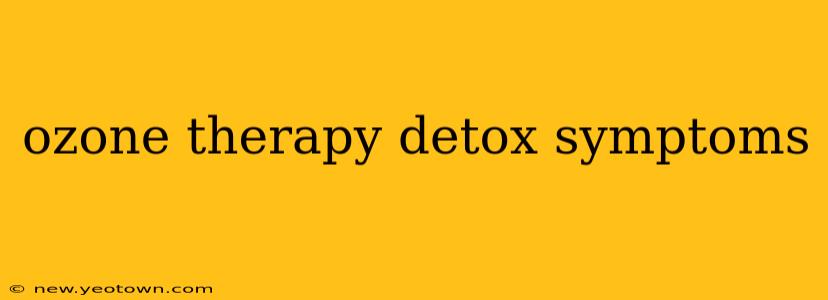Ozone therapy, a controversial alternative medical treatment, involves introducing ozone gas into the body. While proponents claim it offers various health benefits, including detoxification, it's crucial to understand that its effectiveness and safety remain largely unproven by mainstream medical science. Many reported "detox symptoms" are actually reactions to the ozone itself or pre-existing conditions, not a sign of successful detoxification. Let's explore this further.
What is Ozone Therapy and How Does it Supposedly Detoxify?
The core idea behind ozone therapy's detox claims is that ozone, a highly reactive form of oxygen, can oxidize toxins in the body, making them easier to eliminate. Proponents suggest it can improve blood circulation and boost the immune system, indirectly aiding detoxification processes. However, the scientific evidence supporting these mechanisms is weak and often lacks rigorous methodology. Ozone therapy is administered through various methods, including intravenous infusions, rectal insufflation, and topical application. It's important to note that these methods are not typically approved or regulated by medical authorities in many countries.
What are the Reported Ozone Therapy Detox Symptoms?
Many individuals undergoing ozone therapy report experiencing a range of symptoms, often attributed to a "detoxification" process. These symptoms can vary significantly in intensity and type, and are not necessarily indicators of successful detoxification. Instead, they could signify various other reactions. Some commonly reported symptoms include:
Fatigue and Flu-like Symptoms:
Many people describe feeling unusually tired, experiencing headaches, muscle aches, and general malaise after ozone therapy. This could be the body's response to the oxidative stress induced by ozone. These symptoms are not necessarily a "detox" response but could be a side effect of the treatment.
Headache and Dizziness:
These are relatively common reported side effects. While some believe this is part of the "cleansing" process, it could also indicate a more serious reaction to ozone, especially if severe.
Nausea and Vomiting:
These gastrointestinal reactions might be linked to the method of ozone administration. Rectal insufflation, for example, could trigger nausea in susceptible individuals. Again, this is not definitive proof of detoxification but a potential side effect.
Skin Reactions:
Topical application of ozone might cause skin irritation, redness, or itching. These are local reactions to the ozone and not necessarily related to a systemic detox.
Is it Truly Detoxification or a Reaction to Ozone?
This is a crucial point. While ozone therapy proponents link these symptoms to detoxification, it's critical to consider that they might be reactions to the ozone itself or a worsening of underlying health conditions. Ozone is a powerful oxidant, and its interaction with the body could trigger various adverse effects. The lack of rigorous scientific research makes it impossible to definitively state whether these symptoms represent actual detoxification or simply side effects.
Are There Risks Associated with Ozone Therapy?
Yes, ozone therapy carries several potential risks. These include:
- Lung damage: Inhaling ozone can severely damage the lungs.
- Blood clotting problems: Ozone can potentially increase the risk of blood clots.
- Infection: Incorrect administration techniques might lead to infections.
The safety and efficacy of ozone therapy remain largely unproven, and it is not a substitute for conventional medical treatments.
What Should I Do if I Experience Symptoms After Ozone Therapy?
If you experience any concerning symptoms after undergoing ozone therapy, immediately contact your healthcare provider. They can evaluate your condition and provide appropriate medical care.
Disclaimer: This information is for educational purposes only and should not be considered medical advice. Always consult with a qualified healthcare professional before starting any new treatment, including ozone therapy. The views expressed here do not constitute endorsement of ozone therapy.

